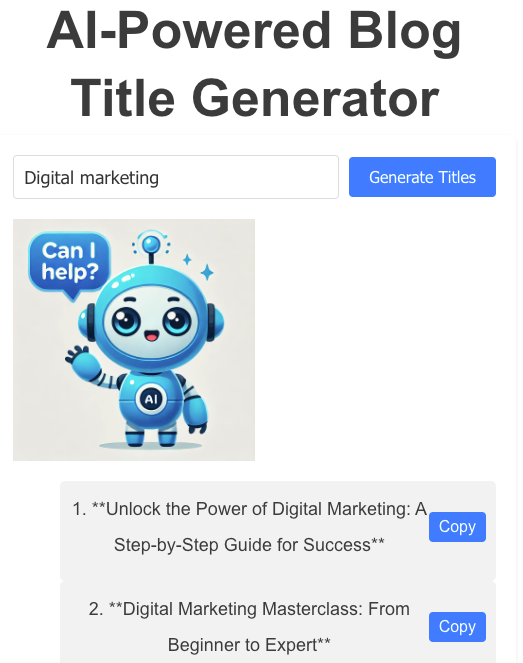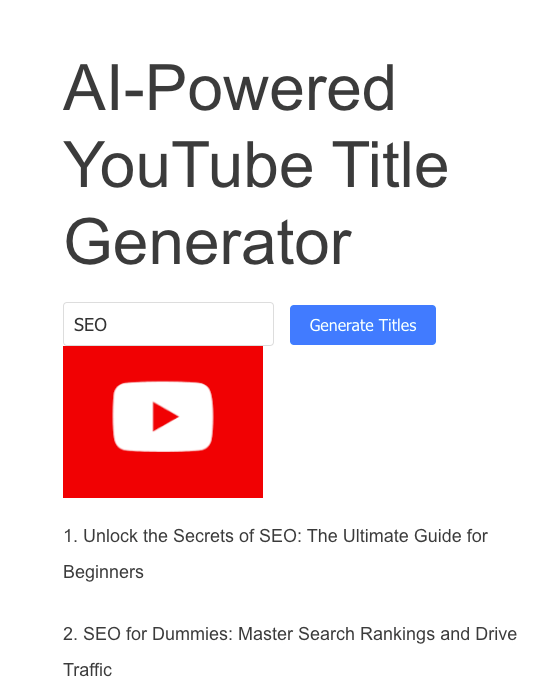AI Blog Title Creation: A Comprehensive Guide
The importance of AI blog title creation cannot be overstated in the ever-evolving digital landscape. A well-crafted title serves as the gateway to your content, determining whether a potential reader clicks through or scrolls past. This guide will explore evidence-based strategies for creating powerful blog titles, including the judicious use of AI tools to enhance—not replace—human creativity.
Understanding the Psychology Behind Effective AI Blog Title Creation
Before delving into specific techniques, it's crucial to understand the psychological principles that make certain titles more appealing than others. According to a study published in the Journal of Marketing Research, titles that evoke curiosity or promise to fill a knowledge gap are particularly effective at driving engagement.
Key findings from the study include:
- Titles that pose questions increased click-through rates by 14%
- Using numbers in titles boosted engagement by 36%
- Titles promising specific benefits saw a 29% increase in readership
(Source: Konnikova, M., & Berger, J. (2019). The Science of Attention-Grabbing Headlines. Journal of Marketing Research, 56(4), 618-633.)
The Foundations of Effective AI Blog Title Creation
1. Know Your Audience
Understanding your target audience is paramount. Conduct thorough audience research using tools like Google Analytics, social media insights, and customer surveys. Create detailed buyer personas that include:
- Demographics (age, location, profession)
- Psychographics (interests, values, pain points)
- Content consumption habits
This information will help you tailor your titles to resonate with your specific audience.
2. Keyword Research: Beyond the Basics
While using relevant keywords is important for SEO, it's equally crucial to understand the intent behind these searches. Use tools like Google's Natural Language API to analyze the semantic relationships between keywords and identify related concepts.
Example:
For the keyword "healthy recipes," the API might reveal related concepts like:
- Nutritional value
- Meal planning
- Dietary restrictions
- Quick and easy preparation
Incorporating these related concepts into your titles can make them more comprehensive and appealing to searchers.
3. The Power of Emotion in AI Blog Title Creation
Research by the Content Marketing Institute shows that titles evoking strong emotions are shared up to 3 times more often than neutral ones. However, it's crucial to strike a balance—overly sensational titles can erode trust.
Effective emotional triggers include:
- Curiosity: "The Surprising Truth About..."
- Urgency: "Why You Need to Act Now on..."
- Empowerment: "Master the Art of..."
- Fear of Missing Out (FOMO): "Don't Make These Common Mistakes in..."
4. Structural Elements of Compelling Titles
Length and Readability
While keeping titles under 60 characters is often recommended for SEO purposes, recent studies suggest that slightly longer titles (70-100 characters) can perform better in terms of click-through rates, especially on mobile devices.
(Source: Backlinko. (2023). We Analyzed 5 Million Google Search Results. Here's What We Learned About Organic Click Through Rate.)
Use of Power Words
Incorporate power words judiciously to add impact to your titles. Examples include:
- Essential
- Proven
- Exclusive
- Revolutionary
- Game-changing
However, avoid overuse, as it can make titles feel disingenuous.
Headline Formulas
While formulas can be useful starting points, avoid relying on them exclusively. Instead, use them as inspiration to create unique, tailored titles. Some effective structures include:
- How-to: "How to [Achieve Desired Outcome] in [Timeframe]"
- Listicles: "[Number] Proven Ways to [Solve Problem]"
- Question: "Are You Making This [Common Mistake] in Your [Area of Interest]?"
- Contrast: "[Common Belief] vs. [New Insight]: What You Need to Know"
The Role of AI in Title Creation
Artificial Intelligence can be a powerful tool in the content creator's arsenal, but it's important to use it judiciously and ethically.
Benefits of AI in Title Generation
1. Efficiency: AI can quickly generate multiple title options, saving time in the brainstorming process.
2. Data-driven insights: Some AI tools can analyze past performance data to suggest optimizations.
3. Language enhancement: AI can help refine phrasing and improve readability.
Limitations and Ethical Considerations
1. Lack of nuance: AI may not fully grasp cultural sensitivities or brand voice.
2. Potential for bias: AI models can perpetuate existing biases if not carefully monitored.
3. Overreliance risk: Excessive use of AI-generated titles can lead to a lack of originality and human touch.
Best Practices for AI Integration
1. Use AI as a starting point: Generate ideas with AI, then refine and personalize them.
2. Combine AI suggestions with human creativity: Merge AI-generated elements with your unique insights.
3. Always review and edit: Never publish AI-generated titles without thorough human review.
4. Continuously learn and adapt: Use performance data to inform future title creation, whether AI-assisted or not.
Measuring and Improving Title Performance
Creating great AI Blog titles is an iterative process. Implement these strategies to continually refine your approach:
1. A/B Testing: Use tools like Google Optimize to test different title variations and analyze their performance.
2. Analyze Click-Through Rates (CTR): Monitor your CTRs in Google Search Console to identify trends and opportunities for improvement.
3. Social Media Engagement: Track shares, likes, and comments to gauge the emotional impact of your titles.
4. Time on Page: A high CTR but low time on page might indicate a mismatch between your title and content.
5. Conversion Rates: Ultimately, measure how well your titles contribute to your overall content goals, whether that's newsletter sign-ups, product purchases, or other desired actions.
Conclusion: The Future of AI Blog Title Creation
As we move forward, the art of crafting compelling AI blog titles will continue to evolve. While AI tools will undoubtedly play an increasingly significant role, the human touch—understanding nuance, emotion, and cultural context—will remain irreplaceable.
The most successful content creators will be those who can effectively blend data-driven insights, AI assistance, and human creativity to produce titles that not only attract clicks but also genuinely reflect the value of their content.
Remember, the ultimate goal is not just to get clicks, but to provide real value to your readers. A great title should be the beginning of a fulfilling reader experience, not a false promise.
By mastering these techniques and approaching title creation with a mix of science and artistry, you'll be well-equipped to create blog titles that resonate with your audience and stand out in the crowded digital landscape.


